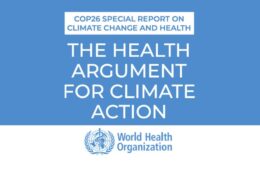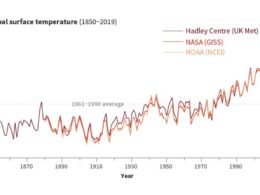“Succumbing to the climate emergency is not inevitable”
The Lancet — Editorial
OCTOBER 30, 2021
VOLUME 398, ISSUE 10311, P1541
NurPhoto/Getty Images
The annual Lancet Countdown on health and climate change, published today, precedes the global convening of political leaders at the UN Framework Convention on Climate Change 26th Conference of the Parties (COP26) in Glasgow, UK, from Oct 31 to Nov 12.
The world is watching COP26-widely perceived as the last and best opportunity to reset the path to global net zero carbon emissions by 2050-and public interest in climate change is higher than ever, in part due to global youth activism and engagement.
The four objectives of COP26 are:
- first, to secure global carbon net zero by 2050 and to keep the 1·5°C limit on warming within reach;
- second, to adapt to protect communities and natural habitats;
- third, to mobilise finance; and,
- finally, to work together to deliver the rules and regulations of the Paris Agreement, while accelerating action through collaboration between governments, businesses, and civil society.
But these goals are at risk.
UK leadership is weak, its influence eroded by repeated cuts to overseas aid and the absorption of the Department for International Development into a Foreign, Commonwealth & Development Office.
Humanity enters COP26 in a perilous position-climate change is already having devastating effects on health, as set out in the latest Lancet Countdown report.
The world is not on track to meet the 1·5°C limit on warming, nor the 2015 Paris Agreement limit of well below 2°C.
- Global greenhouse gas emissions dipped by 6·4% in 2020, but have since rebounded, and country-level nationally determined contributions fall far short of the necessary targets, with few exceptions.
- Australia, Brazil, China, Russia, and the USA have the greatest greenhouse gas emissions. Each remains beholden to fossil fuel companies through government subsidies and excess consumption and, in Australia’s case, continually increasing exports of coal.
- Brazil’s emissions are linked to loss of the Amazon rainforest through clearance for agriculture, which is also causing biodiversity loss of a global magnitude and destroying Indigenous communities.
Targets and declarations are futile on their own; it is actions that are needed.
Key related areas also must not be neglected, notably food systems.
The food sector accounts for around 30% of global greenhouse gas emissions, and food systems are inextricably entwined with climate change at every level of production and consumption, including livestock and agriculture, land use, and the health co-benefits of better diets.
This year, the first climate famine has been documented in Madagascar, with more than 1·14 million people in a state of famine.
In September, 2021, the UN General Assembly Food Systems Summit defined raising awareness of food systems and transformation of diets as key goals for the health of both people and the planet.
As with the COP26 goals, health is central to these ambitions, yet the enormity of the necessary changes seemingly continues to paralyse action, which by now is non-negotiable.
Both the Food Systems Summit and COP26 lack rigorous independent accountability, essential especially if inequality is to be addressed.
Accountability for climate and health is provided through a network of civil society initiatives, including the Lancet Countdown.
This year’s indicators give a bleak outlook:
- global inequities are increasing, and the direction of travel is worsening all health outcomes.
- Health services in low-income and middle-income countries are in particularly urgent need of strengthening.
However, the future is not necessarily hopeless.
In March, 2021, Dagomar Degroot and colleagues wrote in Nature of five overlapping interdisciplinary pathways that have historically been shared by societies and populations that were resilient to past climate events.
These pathways are:
- exploiting new opportunities,
- developing resilient energy systems,
- utilising trade and resources,
- forging political and institutional adaptations, and
- migration and transformation.
Degroot and colleagues’ work presents a novel, rigorous, and multidisciplinary means of understanding climate change in the context of human history that does not focus solely on isolated disaster and collapse.
This approach — learning from examples of societies that have survived, and even thrived, during climate catastrophes — is potentially revolutionary.
The key message is that the world needs a new era of research that is less focused on forecasts for climate change, and more on predictions of the societal consequences of future warming and how to weather them.
Succumbing to the climate emergency is not inevitable.
Succumbing to the climate emergency is not inevitable.
Originally published at https://www.thelancet.com.
TAGS: Climage Change, Food Systems












